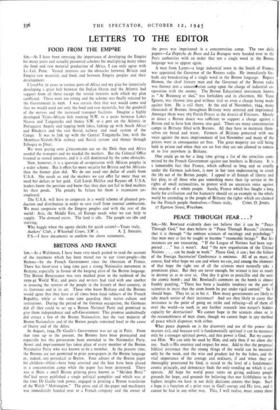LETTERS TO THE EDITOR
FOOD FROM THE EMPIRE SIR,—As I have been stressing the importance of developing the Empire for many years and actually presented schemes for multiplying many times the food and raw material production of Africa, I can only agree with Lt.-Col. Penn. Vested interests are the obstacles between Britain and Empire raw materials and food, and between Empire peoples and their development.
I livedlor 31 years in various parts of Africa and my plan for intensively developing a great belt between the Indian Ocean and the Atlantic had support from all those except the vested interests with which my plan conflicted. These were too strong and the scheme was finally rejected by the Government in 1936. I was certain then that war would come and that we would need not only the food and raw materials, but the goodwill of the natives and the increased transport facilities. Imagine a highly developed Trans-African belt running N.W. to a point between Lakes Nyassa and Tanganyika and thence S.W. to a port on the Atlantic in Portuguese Angola and tapping both lakes, linking up with South Africa and Rhodesia and the vast fluvial, railway and road system of the Congo. It was to link up with the Central Tanganyika line, with the Mombasa-Nairobi-Nile railway and fluvial system and thence through Ethiopia to Jibuti.
We were paying over Doo,000,000 out on the Dole then and Africa needed the transport and we needed the markets. But the Colonial Office listened to vested interests, and it is still dominated by the same obstacles.
Now, however, it is a question of co-operation with African peoples in a wider scheme. But it offers far more security for Britain and for Africans than the former plan did. We do not need one dollar of credit from U.S.A. She needs us and the markets we can offer far more than we need her dollars or her gold. Call Lords Halifax and Keynes off. U.S.A. leaders know the position and know that they dare not fail to find markets for their goods. The penalty fo. failure for them is ro,000,000 un- employed.
The U.S.A. will have to cooperate in a world scheme of planned pro- duction and distribution in order to save itself from internal combustion. We must cooperate with the Empire peoples and with the rest of the world: Asia, the Middle East, all Europe needs what we can help to supply. The demand exists. The land is idle. The people are idle and starving.
Why haggle when the agony shrieks for quick action?—Yours truly,


























 Previous page
Previous page